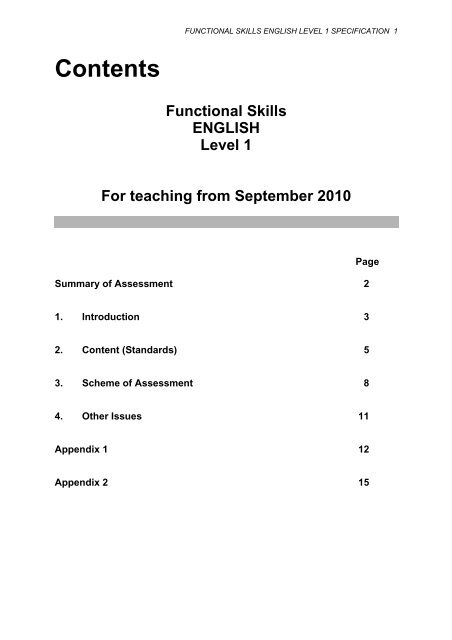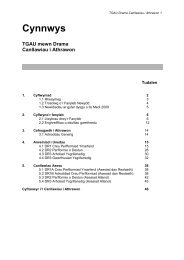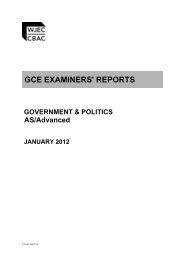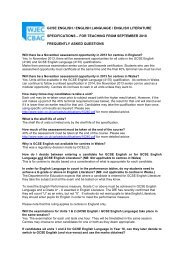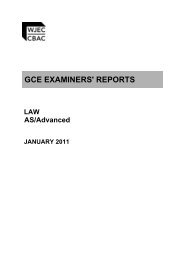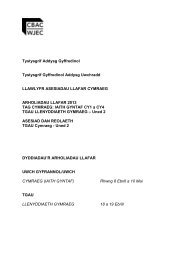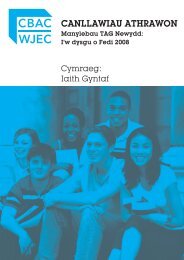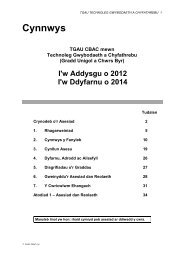FS English Level 1 Specification - WJEC
FS English Level 1 Specification - WJEC
FS English Level 1 Specification - WJEC
Create successful ePaper yourself
Turn your PDF publications into a flip-book with our unique Google optimized e-Paper software.
FUNCTIONAL SKILLS ENGLISH LEVEL 1 SPECIFICATION 2SUMMARY OF ASSESSMENTPaper 1 (1 hour)Reading of instructional, explanatory, and persuasive textsPaper 2 (1 hour)Two informative and persuasive writing tasksSpeaking, listening and communicating (1 hour)Two discussion tasks to cover both formal and informal contexts, whichinclude unfamiliar subjects.Assessment will reflect real life application of the skills for a given purpose.Qualification Accreditation Number: 500/8750/2
FUNCTIONAL SKILLS ENGLISH LEVEL 1 SPECIFICATION 41.3 Prior LearningAlthough there is no specific requirement for prior learning, this specification buildsupon the Programmes of Study for <strong>English</strong> in Key Stages 1-3.This specification may be followed by any candidate, irrespective of their gender,ethnic, religious or cultural background. This specification is not age-specific and, assuch, provides opportunities for candidates to extend their life-long learning.1.4 ProgressionThe skills candidates develop are vital in the further study of any subject at anequivalent level. This qualification subsumes the skills standards required forFunctional Skills <strong>English</strong> at Entry 1-3, and provides progression towards <strong>Level</strong> 2Functional Skills <strong>English</strong>.Similarly, the specification allows the development of skills considered vital by manyemployers.1.5 Overlap and Restrictions on EntryThere are no restrictions on concurrent entry for other qualifications.1.6 Components of AssessmentReading and WritingReading and writing assessment, designed to assess <strong>Level</strong> 1 only, will be externallyspecified and marked.Reading – 1 hour20 marks - based on two different textsWriting – 1 hour40 marks - two forms of writing requiredSpeaking, listening and communicationSpeaking, listening and communication will be internally assessed twice yearly andbased on tasks specified by <strong>WJEC</strong> twice yearly, that will consist of discussion informal and informal contexts and will include unfamiliar subjects. Quality assurancewill be through a visit by a moderator to monitor assessment and record-keeping inthe first year, leading to accredited centre status for the following two years.A mark scale /29 will be used with a pre-set pass mark of 20 for <strong>Level</strong> 1.There will be opportunities for parallel on-screen assessment, provision becomingavailable following the first year of assessments.
FUNCTIONAL SKILLS ENGLISH LEVEL 1 SPECIFICATION 52 CONTENT(STANDARDS)Learners must have the skills and confidence to apply, combine and adapt theirunderstanding, knowledge and skills to new situations in their learning, life and work.They need the capacity to identify and understand the role that functional skills ofcommunication and responsiveness play in the world and use these skills in waysthat enable them to function as effective citizens and benefit them in learning, life andwork.At <strong>Level</strong> 1, learners will be expected to identify and use their communication andresponsiveness skills to contexts and materials that stretch them. Learners will beexpected to apply a range of techniques to produce an appropriate outcome and toapply their skills to situations and materials, demonstrating the confidence to makeinformed choices.2.1 Speaking, Listening and CommunicationUnderstanding and selecting appropriate levels of formality is an important indicatorof progression. To develop their understanding learners need opportunities to usespoken language in contexts that stretch them through unfamiliar subjects.Functional Skills <strong>English</strong> <strong>Level</strong> 1Speaking, listening and communication standardsSkill standardCoverage and rangeIn formal and informal discussions and exchanges,learners can:At <strong>Level</strong> 1, learners will beable to take full part in formaland informal discussions andexchanges that includeunfamiliar subjects• Make relevant and extended contributions todiscussions, allowing for and responding toothers’ input• Prepare for and contribute to the formaldiscussion of ideas and opinions• Make different kinds of contributions todiscussions• Present information/points of view clearly and inappropriate language
FUNCTIONAL SKILLS ENGLISH LEVEL 1 SPECIFICATION 62.2 ReadingReading texts may require learners to interpret graphs, diagrams, illustrations andfeatures of layout which, together with the written element, contribute to the meaningof a text.In reading, complexity, purpose, length and variety of texts are the key indicators ofprogression through the standards. In making judgements about the suitability oftexts all of these factors need to be considered.Functional Skills <strong>English</strong> <strong>Level</strong> 1Reading standardsSkill StandardCoverage and rangeIn a range of texts (including reports, instructional,explanatory and persuasive texts, on paper or onscreen), learners can:At <strong>Level</strong> 1, learners will be ableto read and understand a rangeof straightforward texts• Identify the main points and ideas and how theyare presented in a variety of texts• Read and understand texts in detail• Utilise information contained in texts• Identify suitable responses to texts
FUNCTIONAL SKILLS ENGLISH LEVEL 1 SPECIFICATION 72.3 WritingIn writing, length, level of detail, awareness of purpose, adaptability and complexityare the key indicators of progression. Examples of range include formal letters ofcomplaint, newspaper or magazine articles, blogs, letters of application and reports.Functional Skills <strong>English</strong> <strong>Level</strong> 1Writing standardsSkill StandardCoverage and rangeIn a range of documents on paper or on screen,learners can:WeightingAt <strong>Level</strong> 1, learnerswill be able to write arange of texts tocommunicateinformation, ideasand opinions, usingformats and stylessuitable for theirpurpose andaudience• Write clearly and coherently, including anappropriate level of detail• Present information in a logical sequence• Use language, format and structure suitablefor purpose and audience• Use correct grammar, including correct andconsistent use of tense• Ensure written work includes generallyaccurate punctuation and spelling and thatmeaning is clear55%45%
FUNCTIONAL SKILLS ENGLISH LEVEL 1 SPECIFICATION 83 SCHEMEOF ASSESSMENT3.1 StructureAchievement of Functional Skills <strong>English</strong> requires demonstration of competence atthe relevant level in each of Speaking, listening and communication, Reading, andWriting. These are assessed on separate occasions, Speaking, listening andcommunication to be assessed in the four weeks specified by <strong>WJEC</strong>, and Readingand Writing at a session within the November and May examinations series(timetabled by <strong>WJEC</strong>). Certification will depend on passing each of the Speaking,listening and communication, Reading and Writing components at <strong>Level</strong> 1.Component achievement remains valid for the duration of the qualificationaccreditation period.3.2 DurationSpeaking, listening and communicationAssessment of Speaking, listening and communication at <strong>Level</strong> 1 must consist of twotasks to cover the requirements. This is likely to require more than one session tocreate appropriate contexts and to ensure that all learners have opportunities ingroup work to demonstrate their ability. At <strong>Level</strong> 1, there is a minimum duration ofthree minutes and a maximum of ten applied to each discussion task. Centres areadvised to ensure the size of the group participating in the discussion beingassessed allows for these durations to be observed.Reading and WritingAt <strong>Level</strong> 1, assessment of reading and writing will be through two separate writtenpapers: the reading paper and the writing paper will both be of one hour in duration.3.3 ConditionsSpeaking, listening and communication assessments will be supervised tasks in anappropriate setting (allowing for the required range in purpose, formality andaudience) determined by the centre. A range of resources may be used to ensurethat the form of communication as well as its content is fit for purpose. The overallassessment for a learner must be made by one person. Please refer to the Guidancefor controlled assessment of Speaking, listening and communication in Appendix 2.Reading and writing assessments take the form of a timetabled examinationconducted according to the regulations specified in the JCQ booklet Instructions forthe Conduct of Examinations. Resource material will be used for the Reading paper:reading this within the time allowed will form part of the task.Candidates should have access to dictionaries, thesauri or spell-check facilities, asappropriate.
FUNCTIONAL SKILLS ENGLISH LEVEL 1 SPECIFICATION 93.4 ContextThe assessments (both external and internal components) are concerned withfunctional skills in reading, writing, speaking, listening and communication. Examplesof contexts which provide opportunities to develop suitable questions/scenariosinclude:• work and education• community, citizenship and environment• media and communications• family and social issuesReading and writing assessments will cover a range of texts drawn from the followingtypes:• reports• instructional texts• explanatory texts• persuasive texts• paper-based texts• on-screen textsThe resource materials used for the assessment of reading will be drawn from arange of contemporary paper-based and on-screen instructional, explanatory andpersuasive texts – e.g. leaflets, letters, reports, newspaper articles, advertisements,etc.Pass MarksThe following notional pass marks will be used as targets in task-setting and in markschemes:Speaking, listeningand communicationReading and Writing<strong>Level</strong> 1 69% (20-29) 70%In Speaking, listening and communication, which is internally assessed, a mark scalewill be used to reflect the element of differentiation by outcome in assessment ofthese skills and to facilitate internal standardisation and external moderation andquality assurance.The target of 70% for the externally set and marked reading and writing componentswill be reviewed in the light of evidence of performance and the difficulty of the tasksat the award meeting. The awarding process for this component will include completescripts within a range of marks specified by the principal examiner, mark distributionsand other statistical information including item analysis.All assessment, including that of Speaking, listening and communication, must beundertaken in controlled, supervised conditions. For Speaking, listening andcommunication, this means that the candidate must be made aware that theircontribution is for the purposes of assessment and that the assessment must besupervised and outcomes recorded.
FUNCTIONAL SKILLS ENGLISH LEVEL 1 SPECIFICATION 103.5 Awarding, Reporting and Re-sittingFunctional Skills <strong>English</strong> will be awarded at <strong>Level</strong> 1 to candidates who have passedeach of the Speaking, listening and communication, Reading and Writingcomponents at the required level.Candidates will only be awarded a pass or fail at the level entered. No other level willbe awarded.Component achievement remains valid for the duration of the qualificationaccreditation period. There is no limit to the number of times a candidate may re-sitone or more component(s).CertificationWhere a candidate’s performance is sufficient to meet the level requirements, aFunctional Skills qualification pass certificate will be awarded. No grades are issuedwith respect to these qualifications.A formal statement of results will be available to candidates and will report the levelat which the qualification has been awarded and the level at which the assessmentcomponents have been achieved.The Functional Skills <strong>English</strong> qualification certificate will positively report theassessment component/s that has/have been passed to achieve the qualification.
FUNCTIONAL SKILLS ENGLISH LEVEL 1 SPECIFICATION 114 OTHERISSUES4.1 Access and Fair AssessmentQC(D)A have reviewed the Functional skills standards and assessment criteriathrough wide ranging consultations and have had the materials analysed byspecialist agencies to identify potential barriers to achievement and to mitigate theirimpact. Functional skills assessments are subject to similar analysis and reviewprotocols.Functional skills assessments will provide a valid measure of the candidates' abilityto meet the qualification requirements in line with their normal ways of working.<strong>WJEC</strong> arrangements for Access/Reasonable Adjustments will follow the InclusionStatements for Functional Skills (see Appendix 1).Guidance to question paper setters follows advice in ‘Fair Access by Design’produced jointly by the regulators and the JCQ awarding bodies.This specification has been designed to offer fair access for all candidates and tominimise any later need to make reasonable adjustments for candidates who haveparticular requirements, while preserving the rigour of the qualification. Wherenecessary, <strong>WJEC</strong> will make reasonable adjustments so that candidates withdisabilities can access assessment. These will ensure that candidates are notgiven an unfair advantage or disadvantage compared with candidates not usingreasonable adjustments, or invalidate the assessment requirements set out in thespecification.There will be a large age range with access to the Functional skills qualification. Forexample, younger candidates are likely to have a more limited experience ofemployment within a particular sector than some older candidates. This does notmean that such contexts should always be avoided but sufficient descriptions and/orimages may be necessary to ensure that the contexts are understood by all. Allsource material will use simple language and avoid jargon.Assessments will take account of the need to ensure there is no detrimental effect oncandidates’ performance as a result of culture-specific contexts, for example in thecase of ESOL candidates.Every effort will be made to ensure that source material is free of any form of bias(e.g. gender, ethnic, age) that might favour or disadvantage any candidate or groupof candidates and that specifications and assessment materials provide fair andequal access in terms of disability, gender, race, age, sexual orientation andreligion/belief.In Functional Skills <strong>English</strong> where barriers to access remain, <strong>WJEC</strong> will offercandidates with disabilities, as a last resort, exemptions from individual assessmentcomponents within the qualification. A candidate may be exempt from up to twocomponents..
FUNCTIONAL SKILLS ENGLISH LEVEL 1 SPECIFICATION 12APPENDIX IInclusion Statements for Functional Skills <strong>English</strong>Speaking, listening and communicationSpeaking, listening and communication within Functional Skills <strong>English</strong> qualificationsare defined as non-written communication, normally conducted face-to-face.In exceptional circumstances, assessment may take place remotely, provided thatthe medium through which remote assessment takes place:• does not create barriers to achievement and success• enables candidates to demonstrate achievement against the full range ofstandards using the full range of permitted strategies, and• meets the security requirements specified in criterion 58f of The statutoryregulation of external qualifications (QCA/04/1293).Scope: The arrangements described apply only to assessment leading to theawarding of the speaking, listening and communication component of FunctionalSkills in <strong>English</strong> qualifications.Inclusion Statement for Functional Skills in Speaking, listening andcommunication (all levels)The term 'speaking, listening and communication', as used by these standards, isintended to be interpreted in a broadly inclusive way and is not intended to createany unnecessary barriers to candidates with speech or hearing impairment.The needs of individual candidates will vary but, as guidance, the term should beinterpreted as meaning communication, discussion and presentation that:• can include use of sign language (e.g. British Sign Language, signsupported<strong>English</strong>) provided this is made accessible to all participantsin the discussion. (It is recognised that BSL is a language in its ownright and not a form of <strong>English</strong>. BSL is, however, permitted as analternative to <strong>English</strong> for the assessment of speaking, listening andcommunication where BSL is the candidate's normal way ofcommunicating in the contexts described by the standards. No otherlanguages are permitted as alternatives to <strong>English</strong>);• can include access to augmentative speech equipment and suchsoftware as constitutes the candidate's normal way of working;• does not depend solely on the use of written language or require theindividual/s with whom the candidate is communicating to be able toread (as these skills are covered by the requirements for reading andwriting).
FUNCTIONAL SKILLS ENGLISH LEVEL 1 SPECIFICATION 13ReadingScope: The arrangements described apply only to assessment leading to theawarding of the Reading component of Functional Skills <strong>English</strong> qualifications.Inclusion Statement for Functional Skills in Reading (all levels)Reading within Functional Skills <strong>English</strong> qualifications is defined as theindependent decoding and understanding of written language and text in apurposeful context."Text" is defined as materials that include the use of words that are written,printed, on screen or presented using Braille.As a reasonable adjustment, candidates who are classed as disabled underthe terms of the Disability Discrimination Act (DDA), and use assistivetechnology as their normal way of reading, can demonstrate that they are ableto independently meet the requirements of the reading standards through useof screen reader software.A human reader cannot be used to demonstrate the requirements of thestandards as this does not meet the requirement for independence. As a lastresort, an exemption from the reading requirements can be requested forcandidates with disabilities who cannot use assistive technology.
FUNCTIONAL SKILLS ENGLISH LEVEL 1 SPECIFICATION 14WritingScope: The arrangements described apply only to assessment leading to theawarding of the Writing component of Functional Skills <strong>English</strong> qualifications.Inclusion statement for Functional Skills in writing (all levels)Writing within Functional Skills <strong>English</strong> qualifications is defined as theindependent construction of written text to communicate in a purposefulcontext."Text" is defined as materials that include the use of words that are written,printed, on screen or presented using Braille and which are presented in away that is accessible for the intended audience.As a reasonable adjustment, candidates who are disabled under the terms ofthe Disability Discrimination Act (DDA) and who use assistive technology astheir normal way of producing written texts can demonstrate that they are ableto independently meet the requirements of the writing standards through useof a computer and appropriate software.A human scribe cannot be used to demonstrate the requirements of thestandards as this does not meet the requirement for independence. As a lastresort, an exemption from the writing requirements can be requested forcandidates with disabilities who cannot use assistive technology.
FUNCTIONAL SKILLS ENGLISH LEVEL 1 SPECIFICATION 15APPENDIX 2Administration of Controlled Assessmentfor functional skills:<strong>English</strong> speaking, listening andcommunication at level 1 and level 2
FUNCTIONAL SKILLS ENGLISH LEVEL 1 SPECIFICATION 16IntroductionControlled assessment is a form of internal assessment in which control levels areset for each stage of the assessment process: task setting, task taking and taskmarking.The document should be read in conjunction with the <strong>WJEC</strong> Guidance for Centres –Functional <strong>English</strong>: Speaking, listening and communication <strong>Level</strong>s 1 and 2.Controlled assessmentWhere the Functional Skills <strong>English</strong> qualification criteria allow for internalassessment, this must be undertaken through controlled assessment. At all levels,<strong>English</strong> speaking, listening and communication must be internally assessed.Regulations for controlled assessment are defined for three stages of assessment:• Task setting• Task taking• Task markingFor each stage the regulatory authorities have specified a certain level of control toensure authenticity and reliability. <strong>Level</strong> and skill-specific regulations define the levelof control that must operate for the three stages of assessment.<strong>English</strong> speaking, listening and communication at levels 1 and 2For <strong>English</strong> Speaking, listening and communication there is one controlledassessment component which is marked, standardised and awarded as a singleentity.The controlled assessment at all levels will contain a number of tasks/sub-tasks, toensure coverage of the skills standards.Time limits<strong>English</strong> speaking, listening and communication at levels 1 and 2Candidates will have a maximum of one hour to complete speaking, listening andcommunication at both <strong>Level</strong>s 1 and 2. Extra time will be allowed to those candidateswho qualify for it under the existing regulations. Candidates must provide anindividual response for assessment.
FUNCTIONAL SKILLS ENGLISH LEVEL 1 SPECIFICATION 17Task Setting<strong>WJEC</strong>-set controlled assessment tasks will be reviewed annually to ensure that theycontinue to set an appropriate challenge.For Speaking, listening and communication at <strong>Level</strong>s 1 and 2, tasks must be selectedfrom a number of comparable tasks provided by <strong>WJEC</strong>. Centres have the opportunityto contextualise some elements of the tasks to best-suit their centre-specificcircumstances.The following suggestions indicate the type of controlled assessment set and thelevel of contextualisation permitted.<strong>WJEC</strong> task set: Discuss and report back on how best to allocate funding for anorganisation with which candidates will have some familiarity. The discussion shouldend with a decision agreed on by the group.Contextualisation permitted: centres may contextualise that generic task set toencompass real-life scenarios particular to their candidature/area. For example:Contextualised Group Discussion – <strong>Level</strong> 1:The learners are asked to read through the scenario (or have it read to them) anddiscuss the facilities needed in the school/college.The school/college has received a Lottery grant of £100, 000, and the learners havebeen asked to discuss the most appropriate way of spending this money that willbenefit the most number of students. Discuss possible ways of spending the moneyusing the following headings:• Sport• Clubs• Canteen• Subject areas – Science (labs); <strong>English</strong>/Media; ICT; Languages; Technology; Art& Design, etc.• Library/Learning Resource Centre• Specific year group’s needsThe group must come to a unanimous decision about how to spend the grant and beable to explain why it would benefit students.Generic Speaking, listening and communication tasks will be published on the <strong>WJEC</strong>secure website in April of each year. At this time, dates will also be released for theavailable windows of assessment.The way the generic Speaking, listening and communication tasks have been / willbe contextualised in each teaching group should be outlined in Form <strong>FS</strong>E3 (this is inaddition to the E3 outlining S&L activities for any GCSE classes) and must besubmitted to the consultative moderator by 1 December each year. It is the centre’sresponsibility to download the <strong>FS</strong>E3 forms from the <strong>WJEC</strong> website (www.wjec.co.uk)and forward them to the Speaking, listening and communication moderator.
FUNCTIONAL SKILLS ENGLISH LEVEL 1 SPECIFICATION 18Task TakingFor Speaking, listening and communicating at <strong>Level</strong>s 1 and 2, candidates arepermitted up to five hours preparation time within the four-week assessment windowfor each series, in addition to the one hour to complete the controlled assessmenttasks. The preparation must be undertaken under limited supervision. Researchand/or preliminary notes will be permitted in the assessment session(s) althoughcandidates may not use scripts in their assessed work.Teacher support should be limited to explanation of the tasks, details of which shouldbe recorded as part of the assessment. If teacher/tutor intervention is used, thisshould be noted and taken into consideration when the assessment is made.The work of individual candidates may be informed by working with others in thepreparatory stage, for example in discussion groups, but each candidate mustprovide responses sufficient to be assessed individually.At <strong>Level</strong> 1, candidates are required to complete two tasks within the speaking,listening and communication component. This will be two discussions selected fromthe list provided by <strong>WJEC</strong>.At <strong>Level</strong> 1, it is expected that discussions could be longer, depending on the ability ofthe candidates, but centres should allow between three and ten minutes for eachtask.
FUNCTIONAL SKILLS ENGLISH LEVEL 1 SPECIFICATION 19Task MarkingAfter the completion of the assessment session, the work will be marked internallyaccording to mark schemes/assessment criteria provided by <strong>WJEC</strong>.The moderation of Speaking, listening and communication will occur at two levels:(i)(ii)Centres are required to ensure that internal moderation has taken place beforemarks are finalised, so that standards applied are in line with those established onexemplar material, and so that a reliable overall rank order has been establishedwithin the centre. Suitable methods of achieving this will depend on the individualcentre's organisation and policy. However, a sample of each teacher'scandidates must be re-assessed by another teacher.Common training DVDs will be used in standardising centres’ assessment ofspeaking, listening and communication. All staff teaching Functional Skills<strong>English</strong> must meet to discuss the training DVD, as an aid to task setting,assessment, and standardisation of marking.If the Consultative Moderator has serious concerns after an advisory visit, the centrewill receive a moderation visit in the same year.Training:The assessment of Speaking, listening and communication will feature on theagenda of the annual round of INSET meetings held in the Autumn term. Referencewill be made to exemplar material. A representative from each centre will beexpected to attend each year’s meeting.Speaking, Listening and Communication Advisory Visits:Consultative Moderators will be appointed with responsibility for a group of centres. Aprogramme of advisory visits will be arranged in the Autumn and Spring terms. Thesevisits will cover:(i)(ii)(iii)centres selected randomly so that all centres are visited at least once everythree years;centres where statistical analysis of marks across all components in theprevious year’s assessments reveals an atypical profile for speaking,listening and communication;centres where the Consultative Moderator has concerns after an advisoryvisit in the previous year.The emphasis of these visits will be on advice and guidance.The format for the visit will be agreed between the centre and the moderator, toinclude the following aspects:(i)(ii)discussion of marking standards, based an the assessment of a group of atleast four students by a teacher/tutor (preferably the person responsible forthe internal moderation) and the moderator);discussion of the content of the Speaking, listening and communicationcomponent (for example, methods of recording and of internal moderation).
FUNCTIONAL SKILLS ENGLISH LEVEL 1 SPECIFICATION 20Guidance for CentresFunctional <strong>English</strong>:Speaking, listening andcommunication<strong>Level</strong>s 1 and 2This document should be read in conjunction with the <strong>WJEC</strong> document Administration ofControlled Assessment for functional skills: <strong>English</strong> speaking, listening and communicationat level 1 and level 2.
FUNCTIONAL SKILLS ENGLISH LEVEL 1 SPECIFICATION 21Speaking, listening and communicationFor both levels 1 and 2, Speaking, listening and communication will be internallyassessed and based on a variety of tasks, to include presenting information andcontributing to group work. Generic tasks will be provided by <strong>WJEC</strong> annually. Thetasks will be sufficiently broad to allow centres to modify them with their own design.Quality assurance will be through a visit by a moderator to monitor task-setting andassessment in the first year, leading to accredited centre status for the following twoyears.A common mark scale /40 will be used with pre-set pass marks of 20 and 30 for level1 and 2 respectively. This reflects the element of differentiation by outcome inassessment of Speaking, listening and communication and facilitates internalstandardisation and (if required) external moderation.MONTH <strong>WJEC</strong> ACTION CENTRE ACTIONAprilGeneric speaking, listening andcommunication tasks published on<strong>WJEC</strong> secure website. Datesreleased for window of assessment.Access tasks and begin preparationfor contextualisation.OctoberModerators notify centres of advisoryvisits and contact details.NovemberCentres download <strong>FS</strong>E3 forms from<strong>WJEC</strong> website (www.wjec.co.uk),complete them and send to theirmoderator. Four week window ofassessment for speaking, listeningand communication.November/DecemberModerators contact centres receivingan advisory visit to arrange a mutuallyconvenient time for the visit.Agree date for advisory visit.December-FebruaryMarchAdvisory visits take place.Moderation visits take place (where necessary).April-MayFour week window of assessment forspeaking, listening andcommunication.July<strong>WJEC</strong> despatch moderator reports tocentres.
FUNCTIONAL SKILLS ENGLISH LEVEL 1 SPECIFICATION 22<strong>Level</strong> Differentiation<strong>Level</strong> 1At <strong>Level</strong> 1, learners will be expected to identify and use their communication andresponsive skills to contexts and materials that stretch them and which includeunfamiliar subjects. They will also be expected to apply their knowledge and skillswithin a non-routine but familiar context. Learners will be expected to apply a rangeof techniques to produce an appropriate outcome and to apply their skills tosituations and materials with guidance rather than direction, demonstrating theconfidence to make informed choices and knowing when to seek guidance.<strong>Level</strong> 2At <strong>Level</strong> 2, learners will be expected to analyse situations and tasks, identifying therelevant skills in order to apply their knowledge, understanding and skills to suit thesituation or task. In addition, they will be expected to apply their knowledge, skills andunderstanding within non-routine and non-familiar contexts. Learners will also beexpected to demonstrate the application of a wide range of techniques to produce anappropriate outcome and to operate independently, demonstrating the capacity tocomplete activities effectively in order to overcome challenges and producesuccessful outcomes.The evidence on which final assessment is based must include two tasks specificallydesigned to elicit oral skills in these contexts:1. group work2. presentation (<strong>Level</strong> 2 only)Group work may include work in a paired situation. It may involve taking on a rangeof roles. The talk here will include formal and informal contributions in both familiarand unfamiliar situations.The presentation could be a talk given to a group or a sustained contribution to agroup activity, for example a formal debate or a discussion. It is likely that the talkhere will be of a more formal nature and may involve unfamiliar contexts.At <strong>Level</strong>s 1 and 2 the duration of the assessment of Speaking, listening andcommunication should last no more than one hour. In practical terms it is suggestedthat time should be allocated as follows:<strong>Level</strong> 1 Group Discussion: minimum 3 minutes / maximum 10 minutes (x 2 tasks)<strong>Level</strong> 2 Group Discussion: minimum 5 minutes/ maximum 15 minutes (x1 task)<strong>Level</strong> 2 Individual Presentation: 3 -10 minutesFor speaking, listening and communicating at <strong>Level</strong>s 1 and 2, candidates arepermitted up to five hours preparation time within the four-week assessment windowfor each series, in addition to the one hour to complete the controlled assessmenttasks. The preparation must be undertaken under limited supervision and candidatesmay be allowed supervised access, for example, to sources such as the internet.Research and/or preliminary notes will be permitted in the assessment session(s)although candidates may not use scripts in their assessed work.
FUNCTIONAL SKILLS ENGLISH LEVEL 1 SPECIFICATION 23Suitable activities might include:Group discussion, formal or informal, of a current issue or community/workplacescenario. It may be that a range of roles are assumed in order to involve perspectivesother than the speaker’s own and topics beyond his or her own immediate experience.Presentations could focus on an individual talk as a summative response to a groupdiscussion or reaction to information from another speaker.It is important that these activities should be based on real life uses and audiences.For further exemplification of suitable activities, please refer to pages 32-36.Contextualising tasksCentres may contextualise the generic task set to encompass real-life scenarios particularto their candidature/area. When contextualising the <strong>WJEC</strong>-set tasks, centres must ensurethat the task meets, and indeed, does not exceed, the skill standards; thereforemaintaining the level of the assessment.Any contextualising of the task should be checked against the skills standards and theassessment criteria in order to allow all candidates to access the level targeted. Thedegree of familiarity, technical demand, complexity and independence required should alsobe set in line with the expectations for the level assessed.The way the generic Speaking, listening and communication tasks have been / will becontextualised in each teaching group should be outlined in Form <strong>FS</strong>E3 (this is in additionto the E3 outlining S&L activities for any GCSE classes) and must be submitted to theconsultative moderator by 1 December each year.Examples of how to contextualise tasks are given on pages 32-36, and will be a regularitem on INSET agendas.Recording and MarkingEach candidate will be awarded a level for Speaking, listening and communication whichwill then be fine-tuned (to reflect their position within a level) by the award of a mark on thefollowing scale:GradeMarksU 0 - 191 20 - 292 30 - 40The assessment will be an overall reflection of achievement in Speaking, listening andcommunication, rather than an aggregation of marks for different activities. Theassessment must be made internally.TrainingThe assessment of Speaking, listening and communication will feature on the agenda ofthe annual round of INSET meetings held in the Autumn Term. Reference will be made toexemplar material, including standardisation DVDs (see below). A representative fromeach centre will be expected to attend each year's meeting.
FUNCTIONAL SKILLS ENGLISH LEVEL 1 SPECIFICATION 24Advisory VisitsConsultative Moderators will be appointed with responsibility for a group of centres. Aprogramme of advisory visits will be arranged for the Autumn and Spring terms. Thesevisits will cover:(a)(b)(c)(d)all centres in the first year of the course;centres selected randomly so that all centres are visited at least once every threeyears;centres where statistical analysis of marks across all components in theprevious year's examination reveals an atypical profile for speaking, listeningand communication;centres where the Consultative Moderator has concerns after an advisory visitin the previous year.The emphasis of these visits will be on advice and guidance. The moderator willcontact the centre to arrange a mutually convenient time for the visit, which will lastabout one hour and focus on a group of at least 4 students taking part in Speaking,listening and communication assignments.The format for the visit will be agreed between the centre and the moderator, toinclude the following aspects:(i)(ii)Discussion of marking standards, based upon assessment of a group of atleast 4 students by a teacher/tutor (preferably the person responsible forinternal moderation) and the moderator.Discussion of the content of the Speaking, listening and communicationelement; methods of recording and of internal moderation.Combined GCSE and <strong>FS</strong> Advisory VisitsFor GCSE centres also entering students for the Functional Skills qualification theadvisory visit will cover both this and the differing requirements of GCSE <strong>English</strong>.Given this, it is expected that the combined visit should last about two and a halfhours out of which roughly one hour should be devoted to Functional Skillsassessment and recording practice. A teacher (preferably the person responsible forinternal moderation) should be present throughout.Assessment ExerciseDuring the advisory visit, there will be discussion of marking standards, based uponthe assessment of a group of at least 4 Functional Skills students by a teacher/tutor(preferably the person responsible for internal moderation) and the <strong>WJEC</strong> moderator.
FUNCTIONAL SKILLS ENGLISH LEVEL 1 SPECIFICATION 25Selection of StudentsThe Speaking, listening and communication requirements for Functional Skills arevery specific (and different from those for GCSE). It is intended, therefore, that theassessment exercise for this should be kept separate, with one small groupemployed to accommodate both Group Work (needed for both <strong>Level</strong> 1 and <strong>Level</strong> 2)and Presentation (<strong>Level</strong> 2 only). To this end, it is assumed that a group of 4 studentsshould be sufficient, with 2 students representing each of the two levels.Clearly, task setting will need to take into account the ability range involved in theactivities as well as ensuring compatibility between the individuals making up thegroup. While the audience for the presentations could, helpfully, include some ofthose from the GCSE assessment, thought needs to be given to ensuring that noneof those involved are inhibited by the presence of other students not in the FunctionalSkills group.As with GCSE visits, the purpose of the assessment exercise is to provide a focus forthe discussion of the application of criteria and of marking standards, that is, toinform marking rather than to moderate marks. The students, therefore, can beselected from any year group involved with the Functional Skills assessments.ActivitiesFor further exemplification of suitable activities, please refer to pages 32-36.AssessmentBoth moderator and teacher will grade the students on the basis of the activitiesseen. It is important to emphasise that the purpose of comparing judgements is toprovide a basis for the discussion of criteria and standards in general. It will not affectthe actual assessments of achievement that are in progress for these students.These, hopefully, will be informed by the day’s outcomes.Recording and Internal ModerationFor each of <strong>Level</strong>s 1 and 2 Speaking, listening and communication will be internallyassessed and based on best achievement from a variety of tasks. It is a requirement,therefore, that centres put in place systems of recording and internal moderation. Theform of records is not prescribed by <strong>WJEC</strong> but the board has produced a simpleassessment sheet which is very straightforward to use and which has already beenadopted by a number of participating centres (please refer to page 31).Although <strong>WJEC</strong> does not feel it appropriate to be prescriptive about the nature of therecording and internal moderation systems adopted by centres, it is important toemphasise that whatever systems are in place should provide a major focus ofdiscussion with the consultative moderator and that candidates’ records should beavailable on the day.
FUNCTIONAL SKILLS ENGLISH LEVEL 1 SPECIFICATION 26ModerationThe moderation of Speaking, listening and communication will occur at two levels:(i)(ii)Centres are required to ensure that internal moderation has taken placebefore marks are finalised, so that standards applied are in line with thoseestablished on exemplar material, and so that a reliable overall rank order hasbeen established within the centre. Suitable methods of achieving this willdepend on the individual centre's organisation and policy. However, asample of each teacher's candidates must be re-assessed by anotherteacher.Common training DVDs will be used in standardising centres’ assessment ofSpeaking, listening and communication. All staff teaching Functional<strong>English</strong> must meet to discuss the training DVD, as an aid to task setting,assessment, and standardisation of marking.If the Consultative Moderator has serious concerns after an advisory visit, the centrewill receive a moderation visit in the same year.Moderation VisitsA moderation visit occurs where there are concerns about a centre’s assessment ofSpeaking, listening and communication. Concerns that would trigger a moderationvisit would include: inconsistent assessment; task-setting/adaptation of speaking,listening and communication tasks set by <strong>WJEC</strong>; record-keeping. All centres’assessment of Speaking, listening and communication is monitored by the moderatorand by the analysis of assessment data.In the few instances where a moderation visit is required, centres will be asked toselect between 4 and 8 candidates (reflecting the range of marks awarded by thecentre) to take part in the exercise. The sample must be chosen so that groups ofcandidates who are reasonably at ease with each other may be formed. The methodof selecting the sample will depend on the organisation of classes at the centre.There is no need for all teaching groups to be represented or for there to be a rangeof ability in sub-groups within the sample.A Moderation Sample Form indicating the proposed format for the moderationexercise (<strong>FS</strong>E4) will be submitted by the centre to the moderator in advance. Theactivities used for the exercise must bring into play assessment criteria and allow allcandidates to show their abilities in Speaking, listening and communication.At the visit itself a Summative Assessment Form (<strong>FS</strong>E5) must be provided for eachcandidate in the sample. A teacher from the centre will be expected to be presentthroughout, and to assess candidates' achievement in the moderation exercise.Following a moderation visit, centres will be expected to standardise theirassessment and/or administration of speaking, listening and communication in lightof the moderator’s feedback.
FUNCTIONAL SKILLS ENGLISH LEVEL 1 SPECIFICATION 27Functional Skills <strong>English</strong>Speaking, listening andcommunicationOutline Of Activities<strong>FS</strong>E3Centre Name: _________________________________ Centre No.: _________________Teacher's Name : ________________________________________Please read the notes overleaf before completing this form.Outline below how the two activities for each level (as appropriate) have been contextualisedin your teaching group for the assessment of Speaking, listening and communication. For<strong>Level</strong> 1 candidates, the activities should be group discussions, whereas to meet thespecification requirements for <strong>Level</strong> 2, one of these activities must be a presentation andone must be a group discussion.Signed ______________________________________________ Date _____________
FUNCTIONAL SKILLS ENGLISH LEVEL 1 SPECIFICATION 28Notes1. In view of the range of work which may contribute to the assessment of Speaking,listening and communication, you are asked to outline the two contextualisedactivities which will be used as evidence for this assessment. You may include workstill to be undertaken.2. Where a teacher is responsible for more than one teaching group, there is no need tosubmit a separate form for each group. A single form may be returned on behalf ofthe centre as a whole, providing it reflects the approach across teaching groups.
FUNCTIONAL SKILLS ENGLISH LEVEL 1 SPECIFICATION 29FUNCTIONAL SKILLS ENGLISHSPEAKING, LISTENING AND COMMUNICATION: MODERATION VISIT SAMPLE<strong>FS</strong>E4Name of Centre __________________________________________________Centre Number __________________________CandidateNumber Candidate Name (Surname first) Mark(40)Suggested Format for Moderation(Indicate Groups)
FUNCTIONAL SKILLS ENGLISH LEVEL 1 SPECIFICATION 30SUMMATIVE ASSESSMENTFUNCTIONAL SKILLS ENGLISHSPEAKING, LISTENING AND COMMUNICATION:MODERATION SAMPLE<strong>FS</strong>E5Centre Name ........................................................... Centre No. .............................Candidate Name ....................................................... Candidate No. ........................Assignment(Give details of context/stimulus, specific objectives, size of group)Group work Presentation1.2.Overall Mark: /40Supporting comments linked to assessment criteria:
FUNCTIONAL SKILLS ENGLISH LEVEL 1 SPECIFICATION 31Speaking, Listening and CommunicationExample of Recording MethodStudent Name: ___________________________________________________Teaching Group: ____________________________Context1 Group work2 PresentationContext1Date Description of activity Teacher comment <strong>Level</strong>/mark2Overall comment and final level/mark:
FUNCTIONAL SKILLS ENGLISH LEVEL 1 SPECIFICATION 32Exemplar speaking, listening and communicationtasksGeneric tasks for controlled assessment in Speaking, listening and communicationwill be provided by <strong>WJEC</strong> on an annual basis. Some examples of these follow, alongwith ways in which teachers might tailor these tasks to their own design.Examples of generic tasks set by <strong>WJEC</strong>:Group Discussion – <strong>Level</strong> 1:Discuss and select items to be included in a school newsletter/sports’report/magazine.OrDiscuss and give feed back on examples of responses to customer complaint.Group Discussion – <strong>Level</strong>s 1 and 2:Discuss and report back on how best to allocate funding for an organisation withwhich candidates will have some familiarity. The discussion should end with adecision agreed on by the group.OrDiscuss and report back on the advantages/disadvantages of a local or school-basedissue with which candidates have some familiarity.Presentation – <strong>Level</strong> 2 only:Give a presentation for parents attending a school open evening and respond toquestions.OrConstruct and deliver a presentation intended for a group of younger pupils (basedon a given scenario).
FUNCTIONAL SKILLS ENGLISH LEVEL 1 SPECIFICATION 33Examples of contextualisation within centres:Group Discussion – <strong>Level</strong> 1:The learners are asked to read through the scenario (or have it read to them) anddiscuss which of the three responses is the most appropriate to the customercomplaint and why they think this is the correct way to deal with the customercomplaint. One learner can then give feedback to the class on their group’sdiscussion and conclusions.Example 1A very busy restaurant has a large number of customers waiting for meals that theyhave ordered some time ago. One family has been waiting for forty-five minutes.The customer catches the waiter’s eye as he is passing, and says, "How much longerwill we have to wait for our meals?"a. "I'm sorry, sir, the kitchen is very busy today.”b. "I'm sorry about the delay. If you give me your order number I'll go and seehow your food is coming along."c. "I'm sorry about the delay. I know you've been waiting a long time. If you giveme your order number I'll go and check with the kitchen how your food iscoming along. "Example 2After paying to get into a special weekend festival, a family sees a notice saying thatthe children's entertainment has been cancelled due to unforeseen circumstances.The mother says, 'We came specifically because your advertisement on the radiosaid there was special entertainment for the children, and now you say it's beencancelled. This is just not good enough."a. "I'm sorry, but the clown has flu. There's nothing we can do about it. Thereare plenty of other things for the children to see and do. "b. "Yes, I'm sorry. I know it's disappointing when you have been looking forwardto something. Would you like to have a look at the programme, as I'm surethere are lots of other things you would like to see and do. "c. "I'm sorry. Would you like to have a look at the programme, as I'm sure thereare lots of other things you would like to see and do. "
FUNCTIONAL SKILLS ENGLISH LEVEL 1 SPECIFICATION 34Example 3The phone in the accounts office rings and the customer on the line is obviously veryannoyed."This is Jane Brown. Did the other person I was speaking to tell you why I’m calling.""No, I'm sorry, would you mind briefly telling me again.""I've just had a very abrupt letter saying I haven't yet settled my account. Now I sentyou a cheque three weeks ago, and I don’t want to receive letters like this justbecause your records are not up to date. "a. "I'm sorry about that. It's not a problem though, if you give me your accountnumber. I'll check that it's gone through now. "b. "I'm sorry about that. The system often takes a while to show paymententries. If you get another letter just ignore it."c. "I'm sorry you've been sent a reminder letter. It's always upsetting when youknow you have already paid. If you give me your account number I'll checkthat it's gone through now. "Extension:• Learners could discuss what the customers’ responses could be to each ofthese suggestions and explore how each scenario could be resolved.Group Discussion <strong>Level</strong> 1 / 2 (leading to presentation, if required):The learners are asked to read through the scenario (or have it read to them) anddiscuss the facilities needed in the school/college.The school/college has received a Lottery grant of £100, 000, and the learners havebeen asked to discuss the most appropriate way of spending this money that willbenefit the most number of students. Discuss possible ways of spending the moneyusing the following headings:• Sport• Clubs• Canteen• Subject areas – Science (labs); <strong>English</strong>/Media; ICT; Languages; Technology; Art& Design, etc.• Library/Learning Resource Centre• Specific year group’s needsThe group must come to a unanimous decision about how to spend the grant and beable to explain why it would benefit students.Extension:• Learners report back to Pastoral Leader (Head of Year, Senior Leadership) in apresentation as to the group’s findings and the rationale for theirrecommendations.
FUNCTIONAL SKILLS ENGLISH LEVEL 1 SPECIFICATION 35Group Discussion – <strong>Level</strong> 1/ 2:The learners are asked to read through the scenario (or have it read to them) anddiscuss options concerning the potential sale of school playing fields to asupermarket chain.A supermarket chain is interested in buying the field of a local secondary school tobuild a large store on the site. Local residents and school users have been asked fortheir views on this proposal. Discuss in groups the advantages and disadvantages ofthis proposal. The following headings can be used to structure the discussion:• Advantages/Disadvantages for the school• Advantages/Disadvantages for the students• Advantages/Disadvantages for the residents• ConclusionsExtension:Learners report back to the senior leadership team in a presentation as to the consensusof the group, the different points explored and the rationale for their recommendations.Presentation – <strong>Level</strong> 2:The learners are asked to read through the scenario (or have it read to them) andconstruct a presentation stating a case for adopting a particular charity or theschool/year group/college. The learners not involved with the presentation could actas a panel whose job it is to select the best charity to support based on thepresentations.Learners have been asked by the School Council (or equivalent) to nominatecharities which the student body could consider as potential good causes to adopt asa year group/school/college. Individuals should prepare a three to four minutepresentation giving the following information:• What kind of work the charity does;• Why it is an important charity to support;• Why it would be an appropriate charity to be supported by the school/college;• Ideas for fund-raising.Presenters should be prepared to take questions from the panel following theirpresentation.
FUNCTIONAL SKILLS ENGLISH LEVEL 1 SPECIFICATION 36Presentation – <strong>Level</strong> 2:The learners are asked to read through the scenario (or have it read to them) andconstruct a presentation giving information to parents/students for a school/collegeopen evening. The learners not involved with the presentation could act asparents/potential students at the school/college and ask questions following thepresentation.Learners have been asked by the Headteacher/Principal to give a presentation toparents and potential students at an upcoming open evening. The presentation willhave to give information about:• The school/college• The staff• The facilities• The subjects offered• Clubs/extra curricular activitiesPresentation – <strong>Level</strong> 2:The learners are asked to read through the scenario (or have it read to them) andconstruct a presentation giving information to a group of young children on a topicsuch as road safety.Learners have been asked by the Headteacher of a local primary school to give apresentation on road safety to a group of Year 6 children (10-11 year olds) after achild at the school had been knocked-down whilst crossing the road.
FUNCTIONAL SKILLS ENGLISH LEVEL 1 SPECIFICATION 37Speaking, Listening and Communication Marking GuidelinesAssessment Criteria – Group discussion0 marks Not worthy of credit.Band 1(Secure fail)1–4 marks According to quality to those who, in familiar exchanges (formaland informal) can follow the gist of a discussion making simplebut clear contributions.Band 2(Threshold fail)5–9 marks According to quality to those who, in familiar exchanges (formaland informal), can follow the main points of a discussion makingmore extended contributions using appropriate language.Band 3(L1 pass)10–14 marks According to quality to those who, in formal and informalexchanges that include unfamiliar subjects show more developedlistening skills and some awareness of audience and register intheir contributions to discussion.Band 4(L2 pass)15–17 marks According to quality to those who, in contexts including those thatare unfamiliar, show that they are able to deal with more complexinformation and demonstrate active listening skills. They willmake cogent and significant contributions which help move thediscussion forward.Band 5(exceeds L2)18-20 marks According to quality to those who, in contexts including those thatare unfamiliar, show confident awareness of different roles indiscussion and an ability to direct and challenge the group viaincreasingly assured language use and sensitive listening skills.The inclusion of Band 5, which exceeds the standards expected at <strong>Level</strong> 2, in thisassessment criteria is to encourage assessors to use the full range of marks and toexemplify the responses of those candidates who will be performing beyond the standardexpected at <strong>Level</strong> 2 (e.g. Advanced Diploma candidates).


